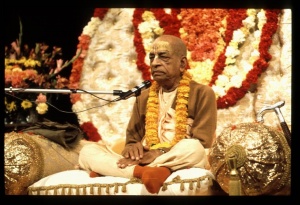CC Madhya 24.224 (1975)

A.C. Bhaktivedanta Swami Prabhupada
Below is the 1996 edition text, ready to be substituted with the 1975 one using the compile form.
TEXT 224
- kṛṣṇa-manane muni kṛṣṇe sarvadā bhajaya
- ’ātmārāmā api’ bhaje,—gauṇa artha kaya
SYNONYMS
kṛṣṇa-manane—in meditating on Kṛṣṇa; muni—saintly persons; kṛṣṇe—unto Lord Kṛṣṇa; sarvadā—always; bhajaya—perform devotional service; ātmārāmāḥ api—also those who are ātmārāmas; bhaje—engage themselves in devotional service; gauṇa artha kaya—this is also another, secondary import.
TRANSLATION
“Saintly persons who are always meditating upon Kṛṣṇa are engaged in the devotional service of the Lord. The ātmārāmas are also engaged in the Lord’s service. That is the indirect import.
PURPORT
The anvācaye meaning of the word ca indicates that between the two words compounded by the word ca, one is given more importance and the other is considered subordinate. For example, “O brahmacārī, please go out and collect alms and at the same time bring in the cows.” In this statement, the collection of alms is of first importance, and the second business of collecting the cows is subordinate. Similarly, one who always meditates upon Kṛṣṇa is mainly a devotee of Kṛṣṇa engaged in His devotional service. Other ātmārāmas are subordinate in devotional service.